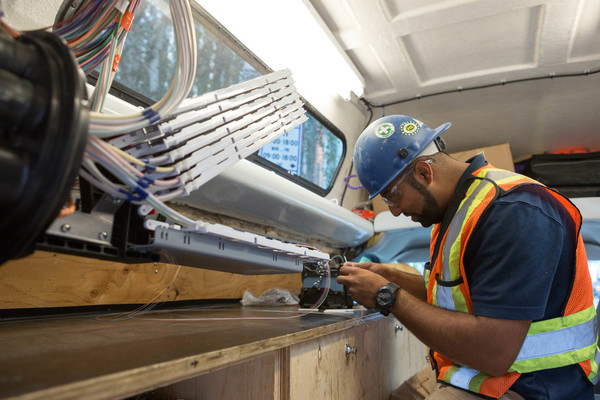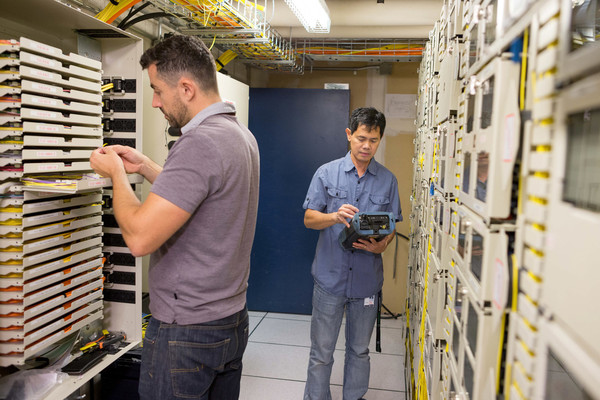IT Solutions & Support plan and budget
This service provides and manages the technology, devices, data, infrastructure, and governance that underpins the delivery of all technology solutions for The City. This service develops and maintains both enterprise and line of business applications and improves and automates business processes to enable City business units to deliver services to Calgarians as well as core internal services.
Our customers
- City employees
- Council and members of their staff
- Civic partners
- Other municipalities
- Calgarians (indirectly)
- Businesses (indirectly)
- External service providers (indirectly)
- Post-secondary institutions (indirectly)
Our partners
- External contracted service providers
- Key partners include City of Calgary Business Unit service owners; Collaboration, Analytics & Innovation; Customer Service & Communications; Law; Corporate Security; Finance; Human Resources; Supply; City Clerks; Facilities.
Value to Calgarians
- architecting, managing, and supporting the technology behind every business and public facing interaction
- encourages economic diversity and resiliency
- provides connectivity and modernized services
What we deliver
- Business Systems & Consultation: Applications, tools, and standards to improve delivery of services to Calgarians.
- Workforce Productivity: Collaboration tools and devices to perform business activities.
- Infrastructure & Platforms: Connectivity and software to enable service delivery.
- Technology Infrastructure for Future Economic Development: Leveraging technology to enhance community building.
Budget breakdown
Operating and capital budgets explained
The budgets you see here are expenditures net of recoveries.
The City develops two budgets to create impact aligned with Council’s Strategic Direction:
- The four-year (2023-2026) operating plans and budgets
- The five-year (2023-2027+) capital plans and budgets
The operating budget includes revenues, recoveries and spending related to ongoing operations. These include:
- Salaries, wages and benefits.
- Day to day programs, maintenance and services.
- Administration costs (e.g., insurance).
- Fuel
- Utilities
- Capital financing costs.
The City's total net operating budget is zero. This means we budget to collect the revenue needed to deliver services to Calgarians — no more, no less. We collect this revenue through property taxes and other sources.
The capital budget pays for long-lived assets. These provide the foundation for the services Calgarians rely on. They include:
- Maintenance of current infrastructure (e.g., bridges, buildings and playgrounds).
- Upgrades to existing community infrastructure.
- New infrastructure to provide services in areas that are underserved (e.g., Green Line).
- New infrastructure for growing areas of the city.
Learn more about our 2023-2026 Service Plans and Budgets.
See how the budget has been adjusted since November 2022
Measuring performance
We are measuring our performance in five areas. Each value is the goal we expect to reach by 2026.

What we've heard
In the 2021 IT Client Satisfaction Survey, 91 per cent of respondents indicated they were satisfied overall, 89 per cent agreed that new IT systems have met their desired business objectives, and 88 per cent agreed IT offers devices and services that allow them to be productive in their daily tasks.
Surveys conducted when IT Service Desk tickets are closed reported 95.5 per cent satisfaction.
The 2021 Quality of Life and Citizen Satisfaction Survey indicated that 83 per cent of Calgarians are satisfied with The City of Calgary website with 82 per cent indicating it is important to them.
The 2021 Service Lines Research Review indicated 60 per cent of citizens prefer to interact with The City online and 70 per cent believe that technology can make a city better. The review indicated 64 per cent of citizens believe that using technology can improve citizens' relationship with The City.
What we're watching
- Technology security remains one of the top concerns for The City. Additional technology risks include business disruption due to system failure, and the ability to sustain the increasing pace of technology change within budget and resource limitations.
- The technology industry's move to subscription-based licensing will require this service to modernize its funding mechanisms.
- The Internet of Things is the network of devices, software, and sensors capable of connecting and exchanging data. Robotic Process Automation blends automation with artificial intelligence to allow systems to learn and make more complex decisions. These trends are present today and are expected to enhance municipal service delivery enabling more efficient service to Calgarians.
- Calgarians expect mobile on-demand personalized self-serve solutions to access municipal services. Emerging technologies will be monitored that have the potential to disrupt municipal services.

Our initiatives
What we plan to do
We will enable future focused, technology savvy, innovative, and modern municipal service delivery, with a mission to modernize skills, data management, processes, applications and infrastructure to deliver innovative, secure and cost-effective technology services.
How we're going to get there
- Optimize technology platforms and applications by balancing business technology investment decisions with corporate solutions.
- Seek efficiencies and ensure compliance in a constantly changing and growing technology landscape by brokering technology services and resources for The City.
- Improve the availability of City services by building, maintaining and supporting secure and resilient technology infrastructure.
- Manage information as a strategic asset by advancing the use, reliability and value of civic data through improved access and analysis.
- Increase availability of online services to Calgarians by providing the technology and support for business units to add municipal services online.

